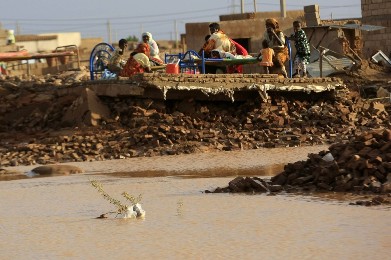WHO puts number of Sudan flood victims at 320,000
August 21, 2013 (KHARTOUM) – The World Health Organisation (WHO) has put the number of people affected by the recent Sudan flood crisis at 320,000 – significantly higher than official figures released so far.

WHO says Sudan’s ministry of health had reported huge gaps related to water chlorination, water quality testing and environmental sanitation.
It recommended that damaged or collapsed latrines be closed with soil to prevent further contamination – an activity not currently being implemented.
Morbidity reports received from Khartoum and Jazira states have also indicated an increase in malaria cases over the past two weeks.
Heavy rains and floods hit large areas of the country earlier this month, leaving a trail of destruction and displacing thousands of people.
According to official figures provided by Sudan’s the interior minister, Ibrahim Mahmoud Hamid, last Thursday, 40,578 families or about 200,000 people have been affected by the floods.
He said 20,207 homes had completely collapsed and 21,999 had been partially damaged, while 3,000 heads of livestock perished and 251 public buildings were impacted.
Initial estimates released by the UN Office for the Coordination of Humanitarian Affairs (OCHA) put the number of affected people at 150,000, with 84,000 in the area around the capital Khartoum.
Poor drainage and urban planning makes Khartoum particularly vulnerable to flash flooding, but even so this year’s surge was unusually severe.
WHO said 48 people had died in the heavy floodwaters, while 70 were injured. Property damage has been reported in 48 localities across 14 states.
Despite the large-scale impact of the floodwaters, Hamid said the situation did not warrant declaring Sudan a “disaster area” which could potentially help solicit more external aid, stressing the situation is under control.
The government has faced increasing public backlash amid claims its flood preparations and response was grossly inadequate.
WHO says it is working to implement a range of health activities in cooperation with other international relief agencies operating in flood affected areas.
Emergency support is currently being mobilised, particularly food, shelter, water, sanitation, hygiene and health services.
MORE FLOOD RELIEF
The Korean government announced on Tuesday it would provide $50,000 in humanitarian aid through WHO to help Sudan recover from floods, including the distribution of hygiene items and disease control.
The German government also pledged 450,000 euros on Tuesday to help with emergency relief, bringing the total humanitarian aid for Sudan this year to about 3.1 million euros.
Similar flood relief was earlier provided by Saudi Arabia, Morocco, Qatar, UAE, Egypt, US, Japan and Ethiopia.
As aid continues to flow from international donors, there have been claims that relief supplies destined for flood victims have been stolen and funds mismanaged.
Meanwhile, the EU said it plans to dispatch humanitarian aid experts to urgently assess the needs on the ground.
(ST)
